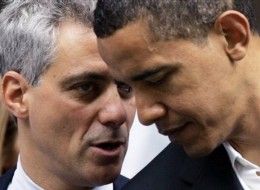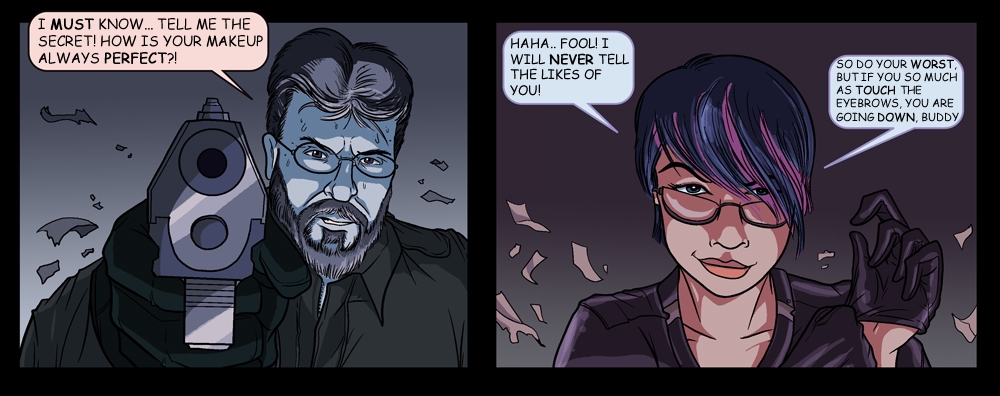Sparky on the attack! As we camp HuffPoCo!

HuffPoCo:Bradley Whitford:Waterboard Dick!!!
Poor Dick Cheney.
Free at last from The Bunker and ready, as always, to do whatever it takes to protect the United States of America, he's seen the vital information that proves that waterboarding works, but, doggone it, the country went and elected this softy-brainiac guy who just doesn't "get it" the way George Bush did, and doesn't want to release it.
Obama's such a wuss, he's making it sound like America doesn't have the guts to torture people anymore.
What's a patriot to do?
It would be illegal to leak classified intelligence himself. Dick Cheney has too much respect for the rule of law to do something like that.
But waterboarding works. American lives are at stake. And Dick Cheney has the all the information we need.
Open your ears America! Are you so jaded you can no longer hear the patriot's call? He's begging us. The time has come.
Waterboard Dick!!!
HuffPoCo: Jennifer Loven: Obama says waterboarding was torture
WASHINGTON — President Barack Obama said Wednesday night that waterboarding authorized by former President George W. Bush was torture and that the information it gained from terror suspects could have been obtained by other means. "In some cases, it may be harder," he conceded at a White House news conference capping a whirlwind first 100 days in office.Obama also expressed much greater optimism now than a month ago that Chrysler could remain a "going concern," possibly without filing for bankruptcy or with a "very quick" one. Obama did not say so, but Italian automaker Fiat Group SpA is expected to sign a partnership agreement with Chrysler LLC by Thursday as part of negotiations to keep the struggling U.S. automaker alive without bankruptcy protection.
The president gave assurance that one way or another Pakistan's nuclear arsenal would not fall into the hands of Islamic extremists. He said he was confident "primarily, initially" because he believes Pakistan will handle the issue on its own. But he left the door open to eventual U.S. action to secure the weapons if need be.
The prime-time news conference was the third of Obama's presidency and the first not dominated by a recession that has thrown millions of Americans out of work.
At a town-hall style meeting in Missouri earlier in the day, as well as in the White House East Room, Obama said progress has been made in rebuilding the economy, yet more remains to be done.
"You can expect an unrelenting, unyielding effort from this administration to strengthen our prosperity and our security _ in the second hundred days, and the third hundred days, and all the days after," he said in opening his news conference.
He called on Congress to enact his ambitious all-at-once agenda, including education spending to produce a better-trained work force, greater support for renewable energy development, a high-priced system for companies to buy and sell rights to emit dangerous pollutants, a vast expansion of health insurance and new rules to rein in the riskiest Wall Street behavior.
Though Obama's most notable legislative triumphs to date have been enacted on party-line votes, he said he remains eager for bipartisan cooperation with Republicans. But, he said, "I can't sort of define bipartisanship as simply being willing to accept certain theories of theirs that we tried for eight years and didn't work and the American people voted to change."
Obama said Pennsylvania Sen. Arlen Specter's switch from Republican to Democrat wouldn't automatically change the math on legislation because of Specter's independence, nor give him a "rubber-stamp Senate." Specter gave majority Democrats 59 votes in the Senate, pushing them one step closer to the 60 needed to overcome Republican filibusters.
But the party change would "liberate" Specter to cooperate with Democrats more than he has in the past, Obama said.
The president also said he was "absolutely convinced" he had acted correctly in banning tough interrogation techniques including waterboarding, which simulates drowning, and in making public the Bush administration memos detailing their use on terrorist suspects. "Not because there might not have been information that was yielded by these various detainees ... but because we could have gotten this information in other ways, in ways that were consistent with our values, in ways that were consistent with who we are."
Obama has come under heavy criticism for his actions from former Vice President Dick Cheney and other Republicans. They have urged Obama to release memos they say will show the tough methods were successful in obtaining information.
Obama told reporters he has read the documents Cheney and others are referring to but said they are classified and declined to discuss their details. In a White House exchange with House Republican leader John Boehner last week, Obama said the record was equivocal.
The news conference lasted an hour and covered topics ranging from the outbreak of swine flu _ which Obama referred to as the H1N1 virus, evidently in deference to U.S. pork producers _ to abortion and the recent flare-up in violence in Iraq.
Alongside wars in Iraq and Afghanistan, the situation in Pakistan has grown more ominous in recent days as a resurgent Taliban shows signs of strength.
Obama said he was "gravely concerned," not about an immediate takeover of the country by the Taliban but because he said the Pakistani government seems unable to deliver basic services and thus gain the kind of public loyalty necessary to survive against challenges over the long term.
The president also gave his strongest public admission yet that the overhaul of the current immigration system that he once promised to tackle in his first 100 days will not happen in 2009. He focused instead on the "key administrative steps" he has directed officials to take this year that he said would demonstrate competence to opponents in the contentious debate.
Obama defended his administration's continuation of Bush's policy that the president has inherent and unchecked power to shield national security information from disclosure _ the so-called "state secrets" doctrine. Obama said that court filings came too quickly in his presidency to go in a new direction but that his advisers are already working on ways to have the doctrine modified, even while he said certain cases will require its use.
With the government now functioning as a major shareholder in financial institutions as well as, possibly, auto companies such as General Motors, Obama also said Washington has no intention of micromanaging private businesses or of remaining an investor for any longer than necessary. "I've got more than enough to do," he said.
But the president said the government does have the right, on behalf of the taxpayers, to "scrutinize what's being proposed and make sure that their money is not just being thrown down the drain."
Obama's intensive schedule marking his 100th day in office demonstrated the degree to which the administration saw both possibility and peril in the milestone _ a symbolic evaluation point since Franklin Roosevelt took office in the depths of the Great Depression in 1933.
Presidential aides have derided it as a media-created "Hallmark holiday" in which the White House participates reluctantly. But they also recognize it is a time frame by which all modern presidents are judged, at least initially, and which can produce negative narratives that dog administrations for years. So the White House heartily embraced the marker, making high-level Obama advisers available anywhere they were needed over the last week and crafting the president's day to maximum advantage.
The opening act of the Obama presidency has been head-turning, not only for the dire times in which he took office but his flurry of activity.
The reward: strong public backing despite a still-staggering economy. An Associated Press-GfK poll shows that 48 percent of Americans believe the United States is headed in the right direction _ the first time in years that more people than not expressed optimism for a brighter future.
But most of what Obama has done so far, as would be expected for little more than three months, amounts to no more than a down payment.
___
Associated Press writer Ben Evans contributed to this report.
Sam Stein: Supreme Court Choice Could Be Hispanic, Woman... Sotomayor Most Frequently Mentioned

Upon hearing news that Justice David Souter would be retiring at term's end, senior White House aides hastily convened a meeting in the West Wing on Thursday night to discuss potential replacements, according to an administration official.
The meeting, in which the steps for filling the vacancy were discussed, was just one step in a Supreme Court planning process that the administration official described as intensive and months old.
Indeed, Barack Obama began preparing for the reality that now confronts him -- an opening on the country's highest court -- before he was sworn in as president, back in December. In transition meetings in both Chicago and Washington, aides to Obama identified and researched potential candidates to fill the Supreme Court bench. Obama was directly involved in the deliberations, said the official, offering guidance on the types of Court nominees would meet his standards and even personally suggesting names.
According to a Democratic strategist with knowledge of the process, many possibilities have been bandied about in these "process groups." But the one most often mentioned has been Sonia Sotomayor, the odds-on favorite who currently sits on the U.S. Court of Appeals for the 2nd Circuit.
The Democrat noted that, in a stroke of prescience or just plain luck, the White House had actually been preparing for a vacancy to pop up sometime during the summer. "They were planning as if they were getting an opening before the end of the summer."
In this respect, they were not caught off-guard upon hearing news of Souter's impending departure. The details of how Obama and his aides have prepared themselves for a Supreme Court retirement reflects a no-stone-left-unturned approach on the part of the administration, as well as an tacit acknowledgment that filling a Court vacancy is one of the more daunting tasks a president faces.
Upon taking office, according to the administration source, the White House intensified the effort it had started during the transition. In meetings in the office of chief counsel Greg Craig, officials began reviewing possible nominees, their judicial records, and personal backgrounds.
As the Democratic strategist added, the team was also cognizant that modern-day research tools could effectively turn up information that traditional vetting processes would miss.
"They are looking at all factors," said the strategist, "including the fact that even the biggest online communication tools and sites have grown significantly since the last confirmation effort [during the Bush administration]."
For all the advanced preparation, however, the news that Souter would be the first justice to step down from the Court likely came as a surprise. Early speculation held that Justice Ruth Bader Ginsburg, who is recovering from surgery for pancreatic cancer, would be the first Obama-era retiree from the bench. But she has vowed to stay on.
Word of Souter's impending departure made its way to the White House via private channels earlier this week. But a formal announcement was not delivered until Friday, when the president entered the White House press briefing room unannounced to tell reporters that the Justice had informed him of his retirement.
Later in the day, the White House released the letter that Souter had penned to the President saying that "when the Supreme Court rises for the summer recess this year. I intend to retire from regular active service as a Justice."
"I mean to continue to render substantial judicial service as an Associate Justice," Souter concluded.
As for filling the seat, the administration official said that the White House was confident that with consultation with the Senate, a new Justice could be confirmed by the first Monday of October, when the Court is back in session.
Be safe out there.





